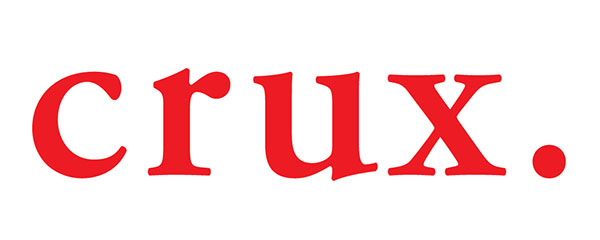By: Melea McRae and Essie Davis
Running a business can feel like an Olympic feat some days, especially in the last two years. There’s no shortage of think pieces on the impact of the COVID, however, we have yet to truly understand the actual toll of the pandemic on our mental health, especially as it relates to the workplace.
When the country shut down in 2020, we eliminated hugs; quarantined from family; started Zooming as ways to work and for our kids to learn; banned travel; stopped sports; closed restaurants, gyms and places of worship; and canceled graduations, weddings and funerals. We lost much of what makes us human: connection and our freedom. We experienced great loss, and we experienced it collectively and deeply.
That unsettling feeling we all experienced was grief.
Like most businesses, when the pandemic hit Crux quickly adapted to a work-from-home model, however we quickly realized the toll of this new work style: silos, isolation, lack of collaboration. We prioritized daily “stand-up” meetings, held weekly virtual happy hours and sent birthday treats to employees’ homes to celebrate, and despite our best efforts, there was no substitute for the true human connection we experienced when working alongside one another in the office.
As business leaders, we must look past lease prices to consider how this extended collective grief cycle and remote work are creating a domino effect within our organizations and the lasting impact that has on collaboration, productivity, culture, recruitment, retention, mental health and more.
Mental health and wellness
The significant losses we’ve all experienced have had huge impacts on our mental health. If you’ve felt foggy, disorganized, depressed, angry, sad or experienced loss of sleep, you’re not alone. As we move through the 5 stages of grief (denial, anger, bargaining, sadness and acceptance), we tend to lean on our connection with family, friends and co-workers to help us move through these stages. Unfortunately, those outlets were severely limited (or in many cases nonexistent) throughout the pandemic as we remained isolated at home, leaving us longing for the days by the watercooler.
The good news is there’s a strong correlation between movement and our mental health, making it easy to have a positive impact. According to the John W. Brick Mental Health Foundation’s Move Your Mental Health Report, research overwhelmingly supports the beneficial role exercise and increased physical activity play in addressing mental health issues, particularly depression and anxiety. Surprisingly, these approaches are rarely included in prevention and treatment of mental illness.
Corporate leaders aren’t often trained on how to take care of their own health, let alone that of their employees. Getting people back in the office (even with masks) to encourage connection and motivate them to get daily exercise together – consider quick, 15-minute walk-and-talk check-in meetings with your team – will go a long way to improving the well-being of the individual, team and organization. These holistic concepts that cost very little, can be easy to implement and have a significant impact on our performance but are often counter to our corporate cultures.
Creativity and collaboration
At Crux, we believe success isn’t achieved alone. Whether it’s an internal brainstorm to unlock creative campaign ideas or a client meeting to talk through business objectives and ways to improve existing strategies, our organization runs on true collaboration.
While the adoption of technologies like Microsoft Teams or Slack create lines of gif-laden communications between teams, we’ve found there’s no substitute for gathering around a table for a creative brainstorm. Gensler has tracked workplace behavior for the past 15 years and conducted studies during the pandemic, which revealed some jarring statistics on collaboration:
“Before the pandemic, U.S. workers spent an average of 43% of their workweeks collaborating either virtually or in person. That number fell to 27% for workers who worked from home in 2020.”
Research from the Organisation for Economic Co-operation and Development notes that tourism, the arts, and the cultural and creative sectors were most impacted by the pandemic, hindering innovation and in many cases, impacting employment globally. While we don’t yet know the true cost of the pandemic on business, it’s clear that the aftershocks are strong and widespread. Marketing isn’t the only industry to benefit from that creativity and collaboration, and by returning to the office, business owners can reinvigorate their teams.
Productivity and eliminating silos
Productivity was considered one of the biggest concerns of C-suite managers during the pandemic, according to Lucid, and 78% of lower-level management felt similarly. While some employees found themselves operating at peak productivity without distractions at home, others were struggling to focus amid wall-to-wall Zoom meetings while playing teacher, dog walker, chef and more – all while avoiding burnout. Just as getting our kids back in school was better for their focus, development and mental health, it’s equally important for employers to get workers back in the office to reinvigorate collaboration and encourage healthy levels of productivity instilled in passion.
It’s no surprise that isolation negatively influences mental health, increasing risk for anxiety, depression and lower emotional well-being. By bringing our teams back together under one roof, we’re improving the wellbeing of the individual, the organization, and the final work product.
Human connection
Whether you’re 5 or 55-years-old, all humans need to feel connected to others – even the introverts who thrived during work-from-home arrangements. While there’s been much discussion on whether businesses need to continue to invest in office space, it’s important to consider the hidden cost of employee mental health. That sense of social connection is one of our fundamental human needs, and it impacts our mental and physical health, as well as longevity.
According to Psychology Today, one telling study showed that lack of social connection is a greater detriment to health than obesity, smoking and high blood pressure. On the flip side, strong social connection leads to a 50% increased chance of longevity, not to mention all the other strong business benefits such as real-time collaboration and communication and the efficiencies that come from being co-located together. While we may have cut down on drive-time and gas money, it’s clear that a video call isn’t always a perfect substitute for those in-person meetings that deepen trust and client relationships.
Retention and recruitment
As a recent Chamber Small Business Top 10 and a finalist in Kansas City Business Journal’s Best Places to Work competition, our strong culture is something we don’t take for granted. We spend a lot of time and energy recruiting great talent, but the hardest work and work we don’t take lightly is creating a culture where people want to be and do their best work.
One of the things we have learned over the last 18 months is the need to prioritize the health and wellbeing of our organization if we want to consistently be our best. As leaders in the workforce, focusing on mental health is a new phenomenon. It was difficult when we had one person experiencing grief and how to help them through the process, but when everyone is moving through these phases – leaders, employees and families – we’re working in unfamiliar territory and the impact is exponential. We need to think differently about how to address this issue but it has become clear that the physical, emotional, mental and spiritual health of our employees needs to be a critical part of our culture going forward.
Anticipating what’s next
As if the traditional stages of grief were not enough, there’s also a form of grief called anticipatory grief, or the constant state of grief (or stress) we find ourselves in as we wait for the next shoe to drop. Anticipatory grief forces us to constantly revisit the different stages of grief, prolonging us in a depressed state, dimming that light at the end of the tunnel.
In March, we felt a sense of hope as people got vaccinated in droves, places of business reopened their doors and mask mandates were lifted. However, the Delta variant quickly seeped into our worldview this summer, as anticipatory grief forced many back into the various stages of grief.
As a business leader, you have to think about your people AND your business, and it can be tough to balance. We’ve been here before, and as herd immunity becomes harder to achieve, we will likely find ourselves here again: isolated at home with limited human connection, thirsty for creativity and collaboration. As a result, what has worked for us as leaders in past, will not continue to work for us in the future. We need to take care of our health – physically, emotionally, mentally, spiritually – and empower our employees to do the same.
There is a famous quote by Maya Angelou that says “Do the best you can until you know better. When you know better, do better.”
As business leaders we now know better, and it’s time for us to do better.
Melea McRae is helping businesses chart a successful path at Kansas City’s first “un-agency.” Connect with Melea on LinkedIn or share your thoughts on Facebook or Twitter.
Essie Davis is a strategic consultant and well-being warrior with more than 30 years of experience in corporate America in senior-level finance and human resources roles. As founder at E²D Performance Consulting, LLC, Essie works at the cross-section of leadership, culture and well-being to help individuals, teams and organizations maximize their performance by taking care of their health physically, emotionally, mentally and spiritually because when employees are healthy and well, they are fully engaged and perform at their best. Learn more at e2dperformance.com.


